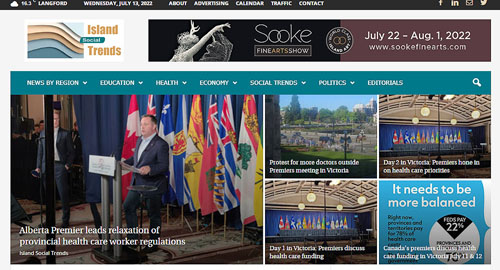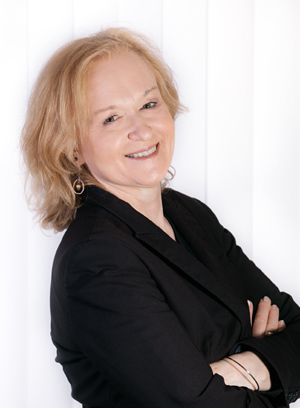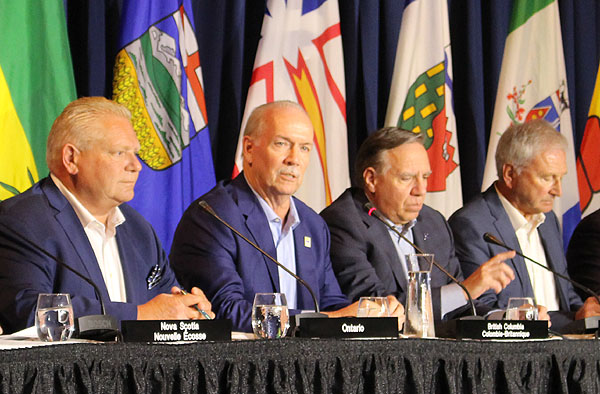
Wednesday July 13, 2022 | VICTORIA, BC [Updated 4:20 pm]
by Mary P Brooke, B.Sc., Editor | Island Social Trends
A top list of priorities for economic recovery and health care was announced at the end of a two-day meeting of Canada’s Premiers, held in Victoria July 11 and 12, 2022.
A key focus of their annual meeting was about how to get a Canada Health Transfer (CHT) funding increase from the federal government. The provinces and territories deliver health care, but receive only 22 percent of the cost of that from the federal government.
Moving priorities along:
As Chair of Council of the Federation (COF), BC Premier John Horgan has led the charge to help preserve the stability and excellence of the Canadian health care system.
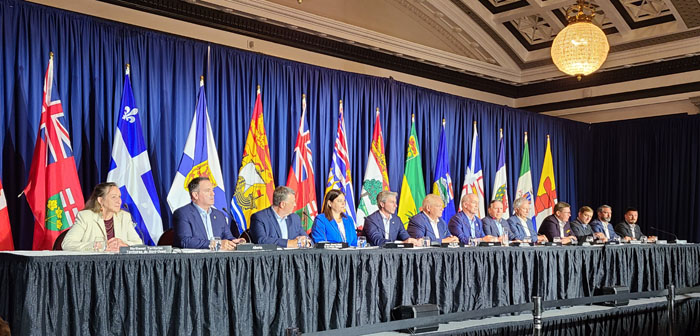
Surrounded by many right-leaning premiers, Horgan (as Canada’s only premier leading an NDP government) has taken the tack of asking for more money.
The Premiers’ priorities:
This week, Canada’s Premiers issued these sets of priorities:
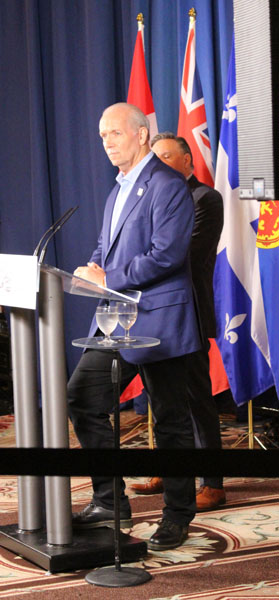
Post pandemic economic recovery priorities:
There is a full range of priorities for the Premiers toward delivering some economic recovery after two years of the pandemic (as released on the second day of the COF meeting, July 12, 2022):
- Strengthening supply chains
- Bolstering labour supply
- Addressing climate change
- Enhancing energy security
- Food security
- Mental health and addictions
- Arctic security and sovereignty
Robust inflation:
Those priorities will have to be dealt with in the context of robust inflation.
In May, the Consumer Price Index (CPI) reached 7.7% in Canada (8.1% in BC), the highest yearly increase in almost 40 years. The Bank of Canada says more than 50 per cent of price categories have risen by 5%.
Today the Bank of Canada raised their rate by 100 basis points to 2.50%, to try an tamp down inflation. That’s the largest jump in the basic rate since 1998. Bank of Canada Governor said today that the base rate will reach 3% by the end of 2023 and not return to 2% (considered a neutral level) until the end of 2024.
The Canadian Federation of Independent Business (CFIB) says that fuel and energy costs are the top factor limiting business growth. Skilled labour and input product shortages were also highlighted by CFIB.
The major banks are hiking their prime rates significantly as of tomorrow.
Health care “immediate challenges”
Calling them “immediate challenges”, the Premiers listed their health care system priorities (on the first day of the COF meeting on July 11, 2022):
- health human resources,
- long-term care,
- home care,
- mental health and substance use,
- pharmaceuticals,
- primary care,
- digital and physical infrastructure.
Trudeau will meet with the premiers:
Prime Minister Justin Trudeau has taken political advantage of ‘the straight ask’ for money money, by insisting there be conditions for the transfer of more annual funds.
“Premiers remain united and are working to improve health care for Canadians. It is past time for the federal government to engage in a meaningful discussion on the CHT,” it was stated by the Premiers this week in Victoria.
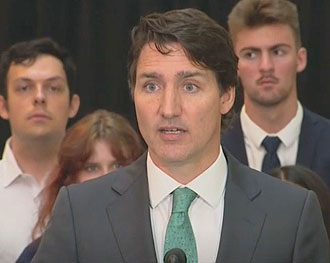
The Premiers yesterday called on the Prime Minister to recognize the urgency of the situation and to “act now to support them” in ensuring that health system can provide the services that Canadians need “when they need them”.
Federal government will be there:
“Yes, the federal govt will be there to invest in health care. But we are going to make sure that those investments will deliver for Canadians,” said Prime Minister Justin Trudeau today.
Trudeau defended his record, saying he has met with Premiers and talked about health care more than any other premier in Canadian history, highlighting the past two years of dealing with the COVID-19 pandemic.
“We will of course continue to work together. becuase there are real pressures faced by Canadians and our health care sstems aacross the country.”
Federal government looking for health care results:
Today the prime minister said he has been speaking with nurses and doctors, and families who’ve had difficulties getting primary care doctor, getting access to surgeries that were put off during the pandemic, and getting mental health supports.
“Delivering concretely” with appointments and support when they people need help, is what Trudeau articulated today. “We need to not just invest dollars into health care, which we’ve committed to doing.” Trudeau articulated that $72 billion of extra funding of health care was spent in the past two years during the pandemic (that would have been vaccine procurement and delivery, provision of personal protective equipment, and other supports).
“Our focus in every province …. that making sure those dollars that we put in deliver real tangible results for Canadians — in shorter wait times, better services, access to a family doctor. That’s what we’ve been pushing on, and continuing to talk to the provinces about.
He said that services and improvements “that have been necessary” haven’t always been delivered by the provinces.
That might include how long term care homes were in many cases not adequately staffed and ventilated which led to many deaths of elderly people during the first year of the COVID pandemic in particular.
The Canadian military had to be brought in to help out in long-term care in Ontario and Quebec; BC handled it better by making sure workers were paid enough that they didn’t have to work multiple locations and take their possible COVID exposure along with them to multiple long term care work sites.
Trudeau wants to make sure that investments will be felt by families, seniors, and people who need services in mental health. “And by those heroes in the system,” he said today, listing off nurses, doctors, orderlies and hospital workers “who’ve been stretched thin and burned out”.
Federal NDP position:
The federal NDP — which has a Confidence and Supply Agreement with the federal Liberal government, says “the health care system is on the brink of collapse”, as stated in a release yesterday, on day two of the Council of the Federation meeting.
The NDP said in their July 12 release that they are calling for “greater financial support through the Canada Health Transfer”. Among other things, they want to see more physicians attracted to be practicing in family care, an increase in medical and nursing school seats, investments in preventative care (something not specified in the premiers’ health priority list), and expanding public long-term care beds.
Health ministers meeting will come first:
Today Trudeau (answering media questions at an electric vehicle battery manufacturing announcement in Ontario) reiterated his December 2021 pledge to meet with the Premiers, but wants more details ahead of negotiations.
It sounds like a first-ministers meeting of Health Ministers is the direction that the federal leadership wants to go with this.
Canada’s Health Minister is Jean-Yves Duclos. BC’s Health Minister is Adrian Dix.
===== RELATED:
Alberta Premier leads relaxation of provincial health care worker regulations (July 13, 2022)
Protest for more doctors outside Premiers meeting in Victoria (July 12, 2022)
Day 2 in Victoria: Premiers hone in on health care priorities (July 12, 2022)
Day 1 in Victoria: Premiers discuss health care funding (July 11, 2022)
===== ABOUT THE WRITER:
Mary P Brooke, B.Sc., Cert PR is the Editor of Island Social Trends — a south Vancouver Island news publication based in the west shore area of the Capital Region — previously delivering news as MapleLine Magazine (2008-2010), Sooke Voice News (2011-2013), and West Shore Voice News (2014-2020).
Island Social Trends has been a daily online news portal at islandsocialtrends.ca since mid-2020, delivering ‘stuff that matters’ through a socioeconomic news lens.
Island Social Trends brings along critical-thinkers among university graduates in English, History and Philosophy as freelance journalist contributors.
Island Social Trends offers newswriting and scholarship opportunities to students graduating from high school in the west shore’s School District 62.




